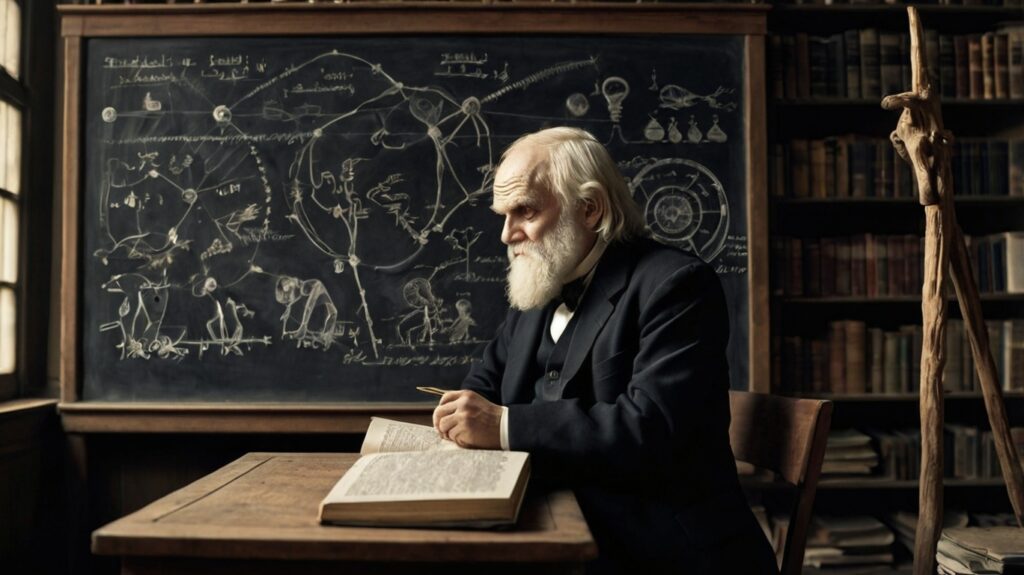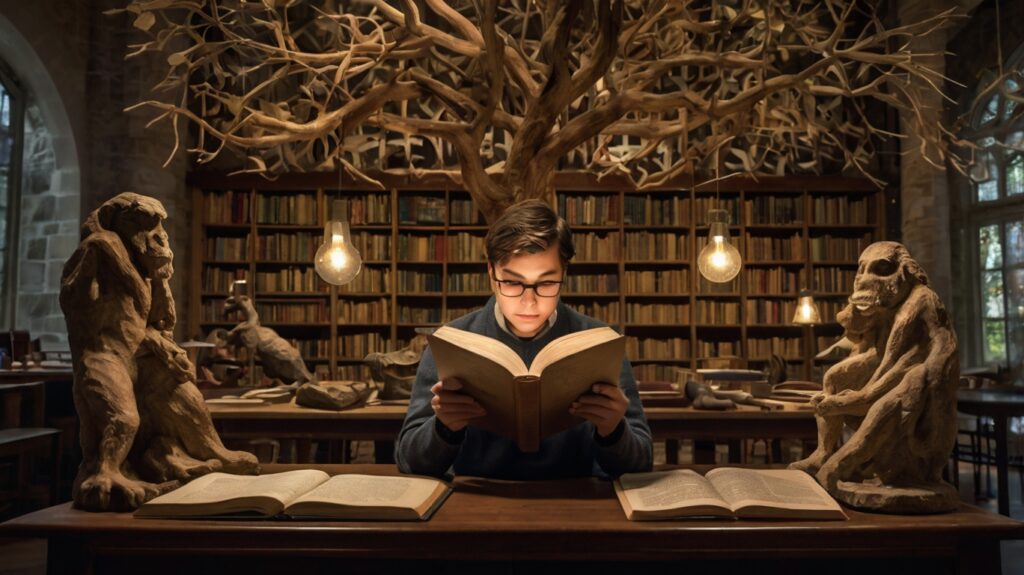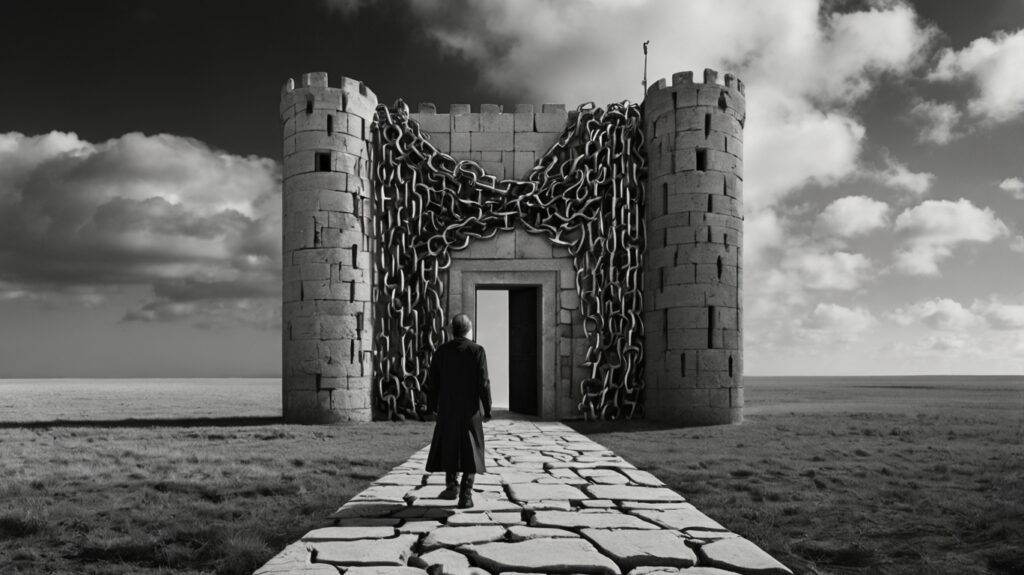Let’s discuss the transformative impact of Charles Darwin’s ideas on my personal intellectual journey and the broader world of thought. We’ll talk about the historical context of Darwin’s groundbreaking theory of evolution by natural selection, its revolutionary implications, and how it stacks up as a monumental intellectual contribution. By exploring the far-reaching implications of Darwinian thinking, we’ll highlight its role in shaping modern thought and its lasting relevance today.
1. A Transformative Encounter: My Journey with Darwin’s Ideas

The landscape of human intellectual history is marked by colossal figures whose contributions have profoundly shaped our understanding of the world. Among these luminaries, Plato, Newton, Darwin, Marx, Einstein and handful others stand as towering influences, each offering insights that have transformed disciplines ranging from philosophy to physics. Sigmund Freud, too, occupies a significant position, his theories about the human psyche reverberating through psychology and beyond. However, amidst these giants, my relationship with Charles Darwin holds a unique and transformative significance. Reading “The Origin of Species” at the age of twenty marked a profound shift in my thinking, particularly given the deeply religious context of my upbringing. As a pivotal moment in my intellectual journey, it opened my mind to new ways of thinking and challenged me to re-evaluate long-held beliefs. In a deeply religious context, Darwin’s ideas provided a framework for understanding the natural world that was both profound and liberating. The impact of this experience has been enduring, shaping my worldview and fostering a lifelong commitment to scientific inquiry and critical thinking. Through Darwin, I discovered the beauty and complexity of life in all its forms, and for that, I remain profoundly grateful.
A Radical Shift in Perspective

Growing up in a religious environment, my worldview was heavily influenced by doctrines that emphasized creationism and divine intervention as the primary explanations for the existence and diversity of life on Earth. This framework, while comforting and familiar, left little room for questioning or exploring alternative explanations. It was within this context that I first encountered Charles Darwin’s seminal work, “The Origin of Species.”
Darwin’s theory of evolution by natural selection presented a radically different perspective on the origins and development of life. His meticulous observations and compelling arguments challenged the notion of a static, unchanging creation and instead advanced a dynamic process driven by natural forces. The idea that species could change over time, adapt to their environments, and give rise to new forms of life was both revolutionary and profoundly unsettling.
The Impact of Darwin’s Ideas on My Thinking
Reading “The Origin of Species” was an experience that profoundly altered my understanding of the natural world. Also, it introduced me to the concept of scientific inquiry as a means of uncovering truth, independent of religious or supernatural explanations. This shift in perspective was not merely an intellectual exercise; it was a profound reorientation of my entire worldview.
1. Embracing Scientific Inquiry:
Darwin’s meticulous approach to gathering evidence and forming hypotheses based on observable phenomena highlighted the power of the scientific method. I began to appreciate the importance of empirical evidence and logical reasoning in understanding the world around me. This new appreciation for science extended beyond biology, influencing my approach to other fields of study and daily life.
2. Questioning Established Beliefs:
The elegance and simplicity of natural selection as a mechanism for evolution prompted me to re-examine many of the religious teachings I had taken for granted. This process of questioning and critical thinking was not an outright rejection of my faith but rather an expansion of my intellectual horizons. I began to reconcile my spiritual beliefs with a more nuanced understanding of the natural world.
3. Recognizing the Interconnectedness of Life:
Darwin’s ideas underscored the interconnectedness of all living beings through a shared evolutionary history. This realization fostered a deeper sense of empathy and respect for the diversity of life on Earth. It also highlighted the fragility of ecosystems and the importance of preserving biodiversity.
4. Understanding Competence without Comprehension:
Darwin’s concept of Absolute Ignorance can be described as the source of all achievements of creative skill. It’s a strange inversion of reasoning that turns upside down one of the most obvious ideas I had: comprehension is the source of competence. We always thought that the best route to competence, in any sphere of activity, is comprehension. Darwin truly inverts that reasoning, showing that absolute ignorance is the artificer. The process of natural selection is breathtakingly competent but utterly mindless. Thus, the organism it designs gets the benefit of all their exquisite equipment without needing to understand them.
Navigating the Tension Between Science and Religion
In a deeply religious environment, embracing Darwin’s ideas was not without its challenges. There was a constant tension between the scientific explanations I found so compelling and the religious teachings that had shaped my upbringing. Navigating this tension required a delicate balance, one that involved open-mindedness, critical thinking, and a willingness to engage in dialogue with others holding different perspectives.
One of the most significant outcomes of this journey was the development of a more flexible and inclusive worldview. I learned to appreciate the value of different kinds of knowledge and to understand that science and religion need not be mutually exclusive. Instead, they could be seen as complementary ways of exploring and making sense of the world.
Darwin’s Enduring Influence on me
Darwin’s influence on my thinking extends far beyond the initial impact of reading “The Origin of Species.” His ideas have continued to shape my approach to understanding complex systems, whether in nature, society, or the human mind. The principles of variation, adaptation, and selection offer valuable insights into a wide range of phenomena, from the evolution of cultural practices to the development of technological innovations. Moreover, Darwin’s work has instilled in me a lifelong curiosity and a passion for learning. It has encouraged me to seek out new knowledge, to question assumptions, and to remain open to new ideas. In this sense, the transformative power of Darwin’s ideas lies not only in their specific content but also in their broader implications for how we approach the pursuit of truth and understanding.
2. Darwin’s Method and Its Lasting Impact

In the history of intellect, discovery, and learning, certain individuals are celebrated for their extraordinary intellectual gifts and versatile genius. Figures such as Leonardo da Vinci and Gottfried Wilhelm Leibniz epitomize this archetype, with their contributions spanning a wide array of fields from art and engineering to mathematics and philosophy. Leonardo, with his prodigious creativity and foresight, and Leibniz, with his groundbreaking work in mathematics and philosophy, are often held up as paragons of intellectual brilliance. In contrast, Charles Darwin, while not possessing the same polymathic prowess, has left an indelible mark on human thought through his common sense, diligence, and willingness to challenge established beliefs. His revolutionary ideas have fundamentally altered our understanding of life on Earth and continue to influence scientific inquiry to this day.
1. Darwin’s Common-Sense Approach:
Charles Darwin’s approach to scientific inquiry was grounded in a profound sense of practicality and observation. Unlike Leonardo, whose imaginative designs often transcended the technological capabilities of his time, or Leibniz, whose abstract thinking revolutionized mathematics, Darwin’s strength lay in his ability to observe, record, and make sense of the natural world through meticulous study. Darwin’s journey on the HMS Beagle provided him with a wealth of observational data. His commonsense approach enabled him to see patterns and connections in the natural world that others had overlooked. By carefully documenting the variations among species he encountered, particularly the finches in the Galápagos Islands, Darwin was able to formulate the foundational principles of natural selection. This pragmatic, evidence-based approach was instrumental in developing his theory of evolution, a theory that was as accessible as it was revolutionary.
2. Assiduity: Darwin’s Tireless Work Ethic:
Darwin’s contributions to science were not the result of fleeting genius but rather a testament to his tireless work ethic and unyielding dedication. Unlike da Vinci, whose interests were often scattered across various disciplines, or Leibniz, who balanced numerous intellectual pursuits simultaneously, Darwin’s focus remained steadfastly on understanding the natural world. His meticulous research involved years of painstaking observation, collection, and analysis. The publication of “On the Origin of Species” in 1859 was the culmination of decades of diligent work. Darwin’s assiduity is evident in his comprehensive notes, exhaustive correspondence with other scientists, and his willingness to refine his theories in light of new evidence. This relentless dedication ensured that his work was not just revolutionary but also robust and enduring.
3. Intellectual Courage: Questioning Established Beliefs:
Perhaps the most significant aspect of Darwin’s legacy is his intellectual courage. In an era when the prevailing scientific and religious orthodoxy held that species were immutable and created by divine design, Darwin dared to propose a theory that fundamentally challenged these beliefs. His willingness to question established doctrines and seek explanations grounded in natural phenomena required considerable bravery and conviction. Darwin’s theory of evolution by natural selection was not just a scientific breakthrough; it was a paradigm shift that redefined humanity’s place in the natural order. By suggesting that all species, including humans, evolved through a gradual process of natural selection, Darwin challenged the notion of human exceptionalism and divine creation. This bold stance invited significant controversy and criticism, yet Darwin remained steadfast in his commitment to scientific truth.
Darwin’s common sense, assiduity, and intellectual courage have had a profound and lasting impact on human thought. Through his commonsense approach to observation, his tireless dedication to research, and his courageous willingness to challenge established beliefs, Darwin has forever changed the way we understand the natural world. His legacy endures not only in the field of biology but also in the broader realm of human thought, reminding us of the power of careful observation, diligent work, and intellectual bravery in the pursuit of truth. His theory of evolution by natural selection has become a cornerstone of modern biology, influencing fields as diverse as genetics, anthropology, and psychology. The principles he outlined continue to inform scientific research and our understanding of life’s complexity and diversity. Moreover, Darwin’s work has transcended the boundaries of science, shaping philosophical and ethical discussions about human nature, our relationship with other species, and our responsibility towards the environment. His ideas have encouraged a more nuanced and interconnected view of life, fostering a sense of humility and stewardship.
3. Darwin’s Theory: The Greatest Idea Ever Conceived
I regard Charles Darwin not only as one of the most influential thinkers in human history but also as the originator of what I consider the single greatest idea ever conceived: evolution by natural selection. This idea stands unmatched in its ability to unite meaning with matter, bridging two realms of reality that have traditionally been seen as worlds apart. On one side, we have the intangible realms of our minds—our goals, hopes, yearnings, and the age-old philosophical question of the Meaning of Life. On the other side, we have the physical universe—galaxies wheeling in their orbits, planets following the laws of physics, and lifeless chemical reactions occurring without purpose or reason. Darwin’s theory ingeniously shows us how the former arises from the latter, creating meaning as it evolves. This “bubble-up” vision of the emergence of significance stands in stark contrast to the traditional “top-down” vision.
The concept of natural selection and the ensuing process of evolution is, in its essence, not complex. Yet, it is so profoundly powerful that some people find it unbearable to contemplate, averting their attention as if faced with a bitter pill. I am perpetually amazed by how Darwin’s idea illuminates the dark corners of existence, transforming mysteries into solvable puzzles and revealing the glories of nature in ways previously unimaginable.
Darwin’s idea systematically deconstructs many traditional concepts, leaving in its wake a revolutionized worldview. Most of the old landmarks of human thought remain recognizable but are fundamentally transformed. We now even understand that DNA is not the sole medium of evolution on our planet, and we can only speculate about other instances of evolution throughout the universe.
Throughout my life, I have often encountered individuals who dread Darwin’s ideas, who almost invariably miss the point when someone tries to explain this “dangerous” notion to them. (To be fair, I have also seen many of these skeptics convert to acceptance when faced with overwhelming, rational evidence.) I always reassure them that after Darwin’s powerful idea sweeps through their cherished domains—whether religion, ethics, art, culture, philosophy, or consciousness—what remains will be just as wonderful, if not more so, albeit subtly transformed.
Darwin’s idea is indeed revolutionary, but it does not destroy what we value in these domains; instead, it places them on firmer foundations and gracefully integrates them with the rest of human knowledge. For centuries, “the arts and humanities” have been considered separate from the sciences, somehow protected from the invasive scrutiny of scientific examination. This traditional isolation, however, is not the best way to preserve what we cherish. Attempting to shield our treasures behind a veil of mystery prevents us from finding their proper anchoring in the physical world—a common mistake, even among the most intelligent individuals. Darwin’s theory of evolution by natural selection offers a comprehensive framework that enriches our understanding of the interconnectedness of all life. It encourages us to look beyond superficial separations and to appreciate the underlying unity that science and philosophy can together reveal. Through Darwin, we gain not only a deeper insight into the mechanics of life but also a profound appreciation for the elegance and complexity of the natural world.
4. Absolutism in Thought vs. Evolutionary Thinking

When people feel that something they love is under threat, their instinctive reaction is often to build an “impenetrable” wall around it. To ensure further protection, they might even establish a buffer zone, enclosing more territory within these fortifications. This strategy appears prudent, offering a defense against the dreaded “slippery slope,” the insidious thin edge of the wedge. The belief is that if you give an inch, the opposition will take a mile. Thus, they extend their defenses as far as possible. However, this approach typically burdens the defenders with a brittle, extravagant, implausible, and indefensible set of dogmas that cannot withstand rational scrutiny. Ultimately, these dogmas must be defended with desperate clawing and shouting, coalescing into a rigid strategic choice.
In the realms of religion, philosophy, and so-called spirituality, this strategic choice often manifests as various forms of absolutism: my interpretation of the religious tradition is the definitive one; human life is the purpose of creation of the universe; at the core of great art and achievements lies divine and inexplicable genius; consciousness is a problem too complex for mere mortals to understand; and hysterical realism asserts that there are deeper, ineffable facts that resolve the puzzles of meaning, even if we are systematically unable to discover them.
This inclination towards absolutism is tempting, partly because it appeals to a sense of human modesty, whether genuine or pretentious. Who are we to declare that there are no ultimate facts to settle these profound issues? Even Einstein succumbed to this temptation in his resistance to the indeterminacy of quantum physics. “God does not play dice!” he famously declared; a stance that ultimately proved unreasonable. When it comes down to it, who are we—or even Einstein—to assert what God does or does not do? This approach is not the right way to address such issues. Yet, we frequently encounter displays of hysterical realism in both our everyday lives and intellectual pursuits.
If one seeks to resist this tendency towards absolutism, evolutionary thinking provides the best antidote. Darwin’s theory demonstrates a way forward, teaching us to embrace uncertainty and complexity rather than retreating behind walls of dogma. His ideas encourage us to adopt a more flexible and open-minded approach, recognizing that our understanding of the world is continually evolving and that rigid defenses of outdated beliefs are ultimately unsustainable.
5. Conclusion: The Transformative Power of Darwinian Thinking
In this essay, I have endeavored to demonstrate that Darwinian thinking profoundly upends traditional worldviews. It challenges the top-down image of designs originating from a supreme intellect, the Intelligent Designer, and replaces it with a bottom-up process driven by mindless, motiveless, and cyclical mechanisms. These processes produce ever more robust combinations until they begin replicating autonomously, accelerating the design process by continuously refining and reusing the best components.
As these initial iterations evolved, they led to multicellularity, enabling the development of more effective exploration mechanisms through sexual reproduction. In one species, this evolutionary pathway eventually led to the emergence of language and cultural evolution, providing the foundation for literature, science, and engineering. These advancements allowed humans to conceptualize and model these processes through plays, novels, theories, computer simulations, and an ever-expanding array of intellectual tools.
Darwinian thinking offers a unifying perspective that is both comprehensive and rich in detailed insights, making it a powerful intellectual tool in its own right. Those who remain resistant to Darwinian ideas must consider that relying solely on traditional methods will likely leave them far from the cutting edge of research in critical areas such as epidemiology, epistemology, biofuels, brain architecture, molecular genetics, music, and morality.
The transformative power of Darwin’s theory lies not only in its specific content but also in its broader implications for understanding the world. It encourages us to embrace complexity and interconnectedness, fostering a deeper appreciation for the dynamic processes that shape life and knowledge. By adopting an evolutionary perspective, we gain a more nuanced and holistic view of existence, enabling us to engage more effectively with the challenges and opportunities of our time.







